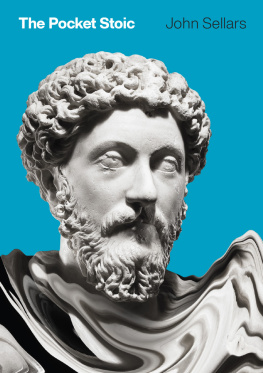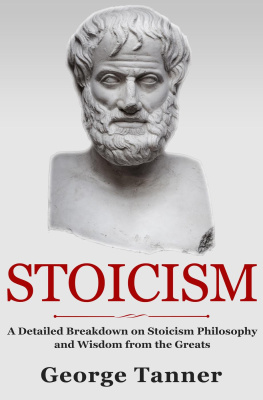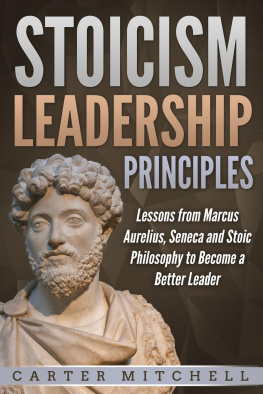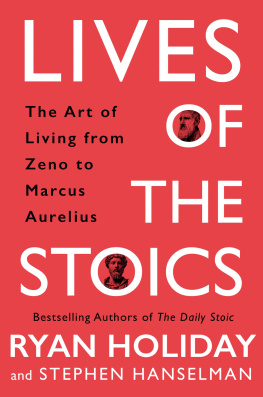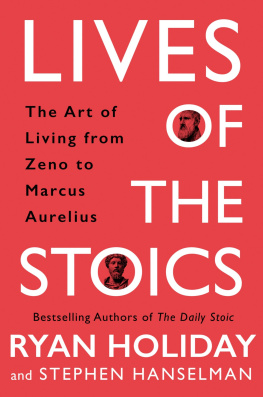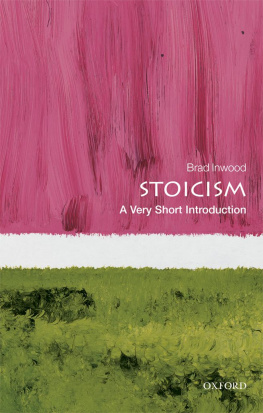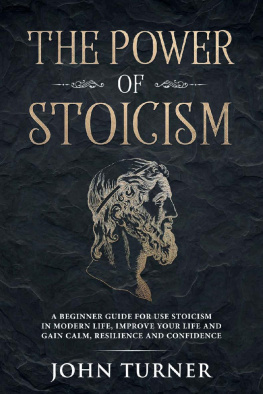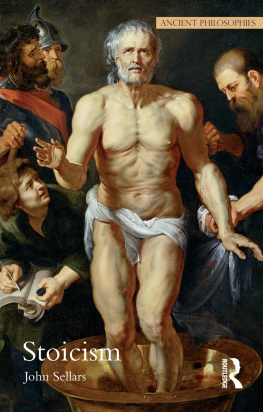John Sellars
LESSONS IN STOICISM

About the Author
John Sellars is a lecturer in Philosophy at Royal Holloway, University of London and a member of Wolfson College, Oxford. He is the author of The Art of Living and one of the founder members of Modern Stoicism, the group behind Stoic Week, an annual global event inviting members of the public to live like a Stoic for a week to see how it might improve their lives.
PENGUIN BOOKS
UK | USA | Canada | Ireland | Australia
India | New Zealand | South Africa
Penguin Books is part of the Penguin Random House group of companies whose addresses can be found at global.penguinrandomhouse.com

First published 2019
Copyright John Sellars, 2019
The moral right of the author has been asserted
Cover design by Tom Etherington
ISBN: 978-0-241-38292-9
This ebook is copyright material and must not be copied, reproduced, transferred, distributed, leased, licensed or publicly performed or used in any way except as specifically permitted in writing by the publishers, as allowed under the terms and conditions under which it was purchased or as strictly permitted by applicable copyright law. Any unauthorized distribution or use of this text may be a direct infringement of the authors and publishers rights and those responsible may be liable in law accordingly.

Prologue
What if someone told you that much of the suffering in your life was simply due to the way you think about things? I dont mean physical suffering like pain or hunger, but all the other things that can negatively colour ones life: anxiety, frustration, fear, disappointment, anger, general discontent. What if someone claimed that they could show you how to avoid all of this? And what if they said that these things were in fact the product of looking at the world in a mistaken way? What if it turned out that the ability to avoid all of these things was completely within your control?
These are all claims that we find in the works of the three great Roman Stoics Seneca, Epictetus and Marcus Aurelius who lived in the first and second centuries AD . Seneca is remembered for his role as tutor to the Emperor Nero, Epictetus was a slave who gained his freedom and went on to set up a philosophical school, while Marcus Aurelius was Emperor of Rome. Their lives could not have been more different, and yet they all embraced Stoicism as a guide to how to live well.
By the time our three Roman Stoics were writing, Stoicism was already hundreds of years old. It all began in Athens. The founder of the school was called Zeno, originally from Cyprus. He was the son of a merchant who, on one account, visited Athens shortly before 300 BC to conduct business for his father. While there, he came into contact with philosophers in the city, and soon began studying with masters from a number of competing schools. Rather than committing himself to any one of these philosophies, he decided to become a teacher in his own right and started to lecture at the Painted Stoa a covered colonnade in the centre of Athens. He quickly gathered a number of followers, who soon came to be known as Stoics the people who gathered at the Painted Stoa. The Stoic school developed under Zenos successors Cleanthes and Chrysippus, both of whom came to Athens from Asia Minor. Subsequent Stoics came from ever further east, such as Diogenes of Babylon. None of the works of these early Stoics survived past the end of antiquity, never making the transition from ancient papyrus scrolls to medieval parchment manuscripts, and what we know of their thought is based on quotations and summaries by later authors.
For our three Roman Stoics, by contrast, we have substantial literary remains. In the case of Seneca, we have essays on a range of philosophical topics, a set of letters to his friend Lucilius, and a number of tragedies. For Epictetus we have a series of discourses written by his pupil Arrian that purport to record lectures from his school, along with a short handbook that digests some key themes from those discourses. With Marcus Aurelius we have something quite different: private notebook jottings that record his attempts to grapple with some of the central ideas in Stoicism and to put them into practice in his own life.
The works of these three Roman Stoics have inspired readers ever since, speaking as they do to some of the day-to-day issues that face anyone trying to navigate their way through life. Their works, fundamentally, are about how to live how to understand ones place in the world, how to cope when things dont go well, how to manage ones emotions, how to behave towards others, how to live a good life worthy of a rational human being. In the chapters that follow well explore some of these themes further. Well begin by considering what the Stoics thought their philosophy could offer, namely a therapy for the mind. Well explore what we can and cannot control, and how the way we think about things can generate sometimes harmful emotions. Well then think about our relationship with the outside world and our place within it. And well conclude by focusing on our relationships with other people, which contribute so much to both the joys and the stresses of daily life. As we shall see, the popular image of the isolated and unfeeling stoic hardly does justice to the rich vein of thought that we find in our three Roman Stoics. Their works have been perennial classics, and for good reason. Their popularity remains undiminished today, with new generations finding helpful lessons in the works of these Stoics.

1
The Philosopher as Doctor
Towards the end of the first century AD a former slave, originally from Asia Minor, whose real name we dont even know, set up a philosophy school in a new town on the western coast of Greece. Hed gone there not entirely through his own choice, having been banished from Rome along with all the other philosophers by the Emperor Domitian, who saw such intellectuals as a potential threat to his rule. The town was called Nicopolis, founded about a century earlier by Augustus, and the ex-slave was known by the name of Epictetus, which in Greek simply means acquired. During the years of its operation, Epictetuss school attracted many students and eminent visitors, not least the Emperor Hadrian, who was far more favourably disposed towards philosophers than some of his predecessors had been. Epictetus himself wrote nothing, but one of his pupils a young man named Arrian who would go on to become an important historian in his own right took notes of the conversations in the school and later worked them up into the Discourses of Epictetus. In the Discourses, Epictetus is quite clear about what his role is as a philosopher. The philosopher, he says, is a doctor, and the philosophers school is a hospital a hospital for souls.
When Epictetus defined philosophy in this way he was following a well-established Greek philosophical tradition that extended back at least to Socrates. In Platos early dialogues, Socrates had argued that the task of the philosopher is to take care of ones soul, just as a physician takes care of ones body. By soul we ought not to assume anything immaterial, immortal or supernatural. Instead in this context we should understand it simply as mind, thoughts and beliefs. The task of the philosopher is to analyse and assess the things one thinks, examining their coherence and cogency. On this almost all philosophers, ancient or modern, would agree.


